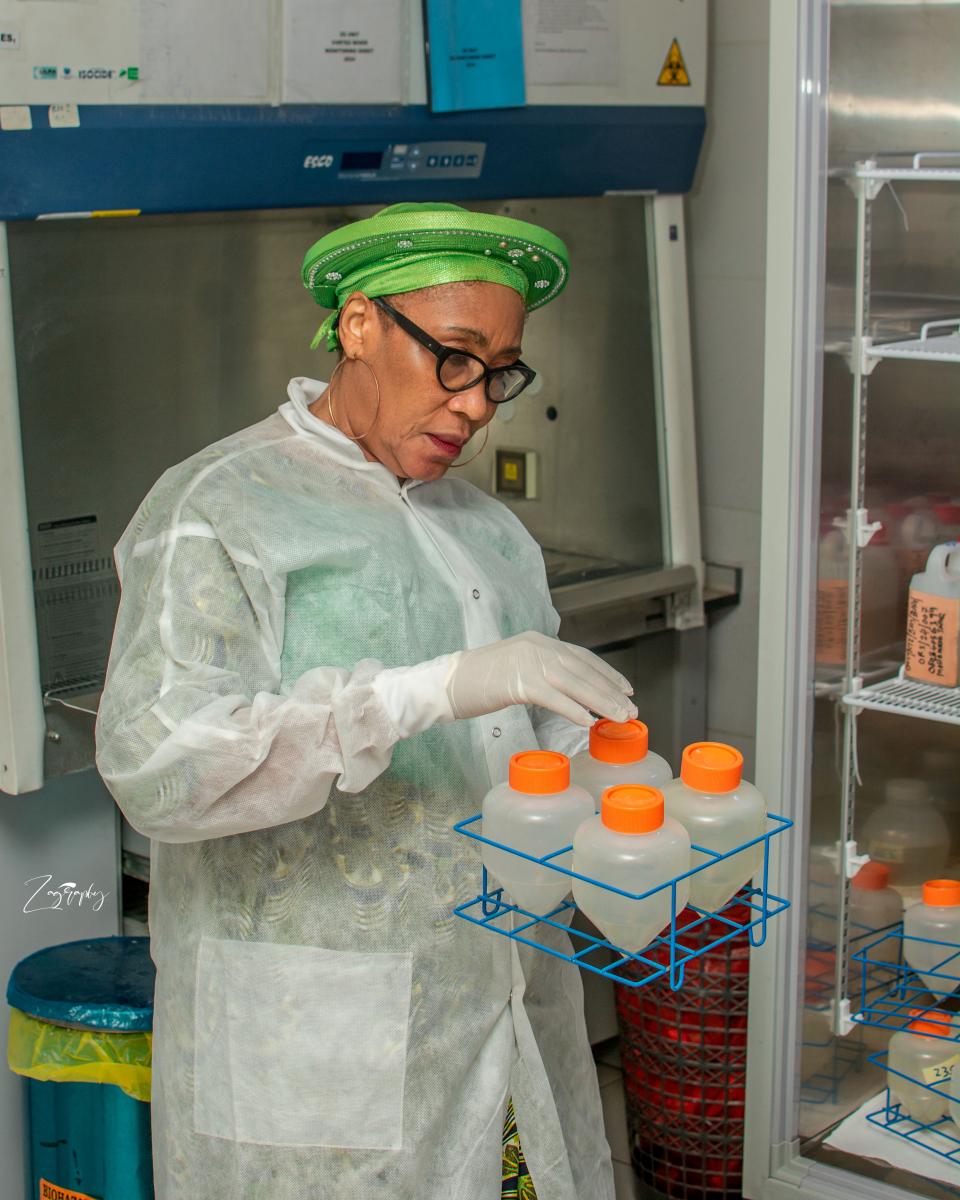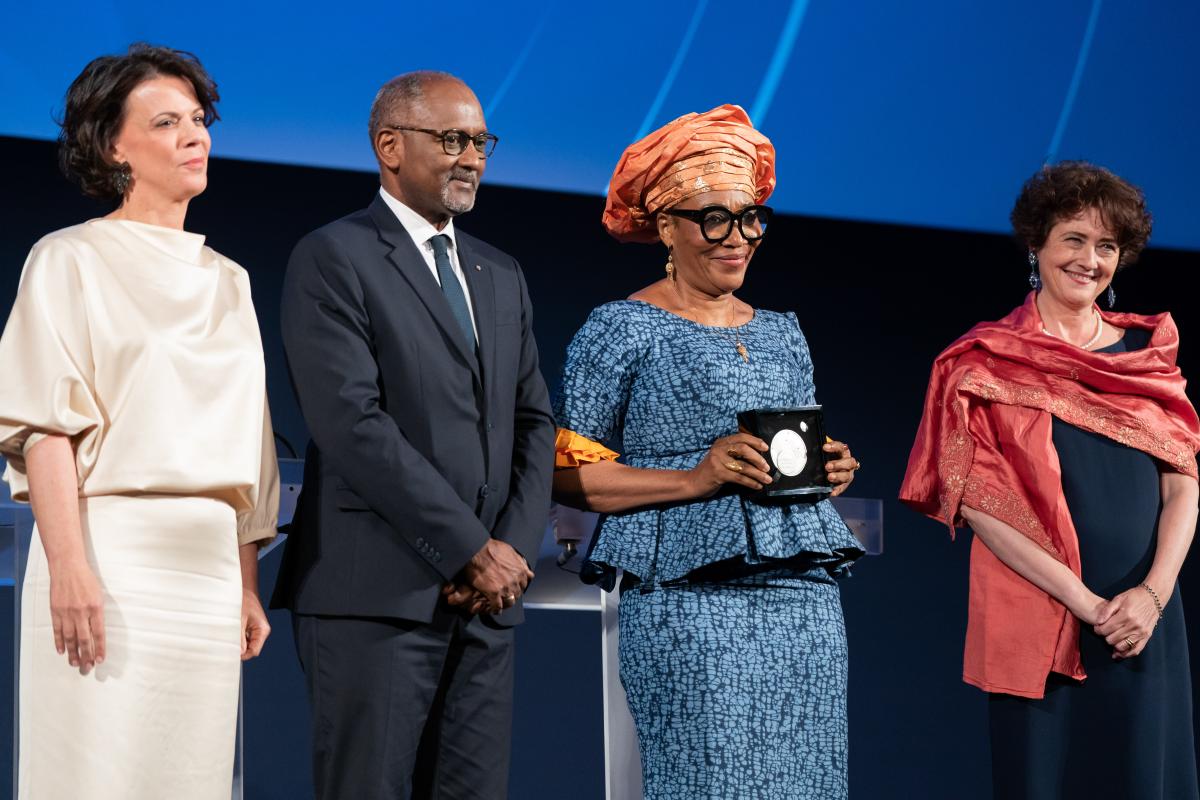
Marycelin Baba
Biological Systems and Organisms
A medical virologist hunting emerging diseases while stamping out familiar ones
There is no reproduction without science. There is no electricity without science. There is no water without science…Life is science, science is life.
Virologist Marycelin Baba is drawn by the allure of the unknown. It was the mystery of microorganisms that first attracted her to microbiology as an undergraduate student at the Ahmadu Bello University, Zaria in Kaduna State, Nigeria: “I was fascinated – how can these living organisms only be seen under a microscope?” But she was further intrigued by the fact that none of her classmates wanted to specialize in virology. “I was curious. What many people shied away from, I wanted to find out, what was there that made people not like it?”
Today, as the head of the Department of Medical Laboratory Science at the University of Maiduguri, she is still working to bring more focus to what she feels are neglected areas of research in medical virology. Her particular passion is arboviruses, the family of viruses that are spread to humans through blood-sucking insects (including mosquitoes) and other arthropods like ticks, and includes dengue, West Nile, yellow fever, Chikungunya, and Zika. “In Nigeria, there is no routine surveillance for arboviruses,” she explains. “Yet, they are there.”
 Most of the arboviruses we are familiar with now were first detected and classified from the 1940s-1970s, many of them under the Rockefeller Foundation Virus Program. When Marycelin was deciding what to focus on for her PhD research, “I asked myself, how come since then there has been no more detection of arboviruses? Does it mean the viruses were no longer circulating? Were they eradicated?” What she discovered is that at the early stages of infection, most arboviruses mimic the same clinical presentation as malaria. Because malaria is hyperendemic in Nigeria, she explains, “Every febrile illness is managed and treated as malaria without any lab tests. People don’t even bother to go to the hospital.” If antimalarial drugs don’t work, they switch to antibiotics, assuming typhoid or another bacterial infection.
Most of the arboviruses we are familiar with now were first detected and classified from the 1940s-1970s, many of them under the Rockefeller Foundation Virus Program. When Marycelin was deciding what to focus on for her PhD research, “I asked myself, how come since then there has been no more detection of arboviruses? Does it mean the viruses were no longer circulating? Were they eradicated?” What she discovered is that at the early stages of infection, most arboviruses mimic the same clinical presentation as malaria. Because malaria is hyperendemic in Nigeria, she explains, “Every febrile illness is managed and treated as malaria without any lab tests. People don’t even bother to go to the hospital.” If antimalarial drugs don’t work, they switch to antibiotics, assuming typhoid or another bacterial infection.
Marycelin started gathering samples from patients who came to the hospital seeking treatment for malaria or typhoid and tested them for the presence of antibodies to West Nile virus, a sign of current or recent infection. She also gathered mosquitoes from the region, to test for viral RNA that would show they were carriers. She found herself struggling for resources at every step, however. At that time, support for virus research in Nigeria was very limited. She had no virology laboratory and no money for reagents, sometimes resorting to purchasing them herself. But when she was offered the opportunity to switch to bacterial research she refused, determined to stick with virology.
For eight years she worked her way slowly toward her PhD. She often took the two-day bus journey – with two small children in tow – from her home in Maiduguri in far northeastern Nigeria to the University of Ibadan on the opposite end of the country, home to the only virology department in Nigeria that awards Masters degrees and PhDs in virology. She scoured the internet daily, looking for opportunities to help her get the resources she needed. In 2000, she found an advertisement for the PhD fellowship from OWSD, at that time still TWOWS, the Third World Organization for Women in Science. The fellowship was new, only in its third year. Marycelin applied and was awarded a sandwich fellowship to continue her research at the Institut Pasteur de Dakar in Senegal. She arrived with data from thousands of mosquitoes to be analysed and sera from patients who sought to be tested for malaria. “I worked from 7 am to midnight every day…I did not want to come back and hear that my data was not enough to give me my PhD.”
In the end, with the help of the PhD fellowship, Marycelin gathered the data she needed and was successfully awarded her PhD in virology in 2005. Her PhD research found West Nile virus in a significant number (greater than 1%) of the patients from whom she gathered data, suggesting that better surveillance and more diagnostic testing for arboviruses are needed when treating patients with febrile illness in Nigeria.
Since she graduated in 2005, she has become one of Nigeria’s leading experts in virology. She was the first woman professor of Medical Virology that graduated in a Nigerian University. Even before graduating, the University of Maiduguri tasked her with starting a new Department of Medical Laboratory Science, a multidisciplinary programme encompassing Microbiology (Bacteriology, Virology, immunology and Parasitology), Haematology, Chemical Pathology, and Histopathology, training students to practice in hospital settings. She was the department’s only faculty member as well as Head when the program began. The then-Provost Professor Abba Hassan, who gave her the responsibility of starting the new programme, emphasized “If that programme fails, you fail…If that programme succeeds, you succeed.” The circumstances were not necessarily in her favour. Maiduguri is in Borno State, a Muslim-majority area of Nigeria where the prevailing opinion was that “women should be in their husband’s house, not in the office.” But Marycelin was determined. “I don’t believe in failure. If you don’t believe in failure, you have to do what it takes not to fail.” The Department can now count more than 20 faculty members and trains an average 60-80 students every year.
In 2006, the World Health Organization (WHO) also tapped her to act as head of its new polio lab in Maiduguri, part of the Global Polio Laboratory Network. The establishment of this lab made it possible for her to perform virology research at her home institute, and also opened doors for an ongoing collaboration with the International Centre for Genetic Engineering and Biotechnology (ICGEB) in Trieste, Italy. At that time Nigeria was one of three countries in the world, and the only one in Africa, where polio was still endemic (the others are Afghanistan and Pakistan). For 12 years, Marycelin juggled both leading the WHO polio lab – running diagnostics to help the eradication campaign in the country – and the Department of Medical Laboratory Science, as well as raising 5 children. In 2020, WHO announced that polio had been successfully eradicated in Nigeria.
 While the polio eradication efforts were eventually successful, they were greatly challenged by the threat of violence in northern Nigeria from the terror organization Boko Haram. During the peak of their activity in 2012, Marycelin found herself in fear for her life. “Nobody was sure of life the next day...many people were killed by stray bullets…How do you think about working? As far as I’m concerned, only a living person can work.” She was able to flee Nigeria with a fellowship from the Institute of International Education’s Scholar Rescue Fund (IIE-SRF), which placed her in South Africa and then Kenya in collaboration with DAAD. For her resilience in this situation, Marycelin was awarded a Medal of Honor by Fondation L’Oréal and UNESCO in June 2023.
While the polio eradication efforts were eventually successful, they were greatly challenged by the threat of violence in northern Nigeria from the terror organization Boko Haram. During the peak of their activity in 2012, Marycelin found herself in fear for her life. “Nobody was sure of life the next day...many people were killed by stray bullets…How do you think about working? As far as I’m concerned, only a living person can work.” She was able to flee Nigeria with a fellowship from the Institute of International Education’s Scholar Rescue Fund (IIE-SRF), which placed her in South Africa and then Kenya in collaboration with DAAD. For her resilience in this situation, Marycelin was awarded a Medal of Honor by Fondation L’Oréal and UNESCO in June 2023.
She returned to Nigeria in 2014 when the threat in the city had significantly subsided. In 2016, Marycelin was awarded a grant from ICGEB to establish a dedicated laboratory for diagnosis and surveillance of arboviruses in Nigeria. The lab, with sequencing facilities donated by ICGEB, is the first of its kind in the northeastern Nigeria. She received a second grant from ICGEB during the COVID-19 pandemic to coordinate testing for the virus in Borno State, which involved upgrading two labs to handle the testing capacity.
As a professor of Medical Virology at the University of Maiduguri, Marycelin’s enthusiasm for her subject is contagious to her students. “When any student passes through me, almost everyone wants to be a virologist…I teach virology with passion.” She is often referred to as the mother of the department, or General Overseer (GO). Among the thousands of students that have passed through her department, many have become virologists practicing all around Nigeria and abroad. “There is an adage that says ‘When you train a woman, you train a nation,’” she says. “But I also say, when you train a teacher, you train the world.”
Marycelin learned at primary school that education was her ticket out of the life that felt skewed in favour of boys. As a child in Akwa Ibom in southeastern Nigeria, “I was raised in a family where males were free to do anything they liked – but me as a female, I was tied down to household chores…I was being prepared to be a wife and a mother. I did not understand why such discrimination should occur. But when I realized that educated people were not like me, were not tied down by household chores, I determined to receive an education that will set me at liberty.”
Now, she wants to make sure other young girls are able to follow in her footsteps. Together with colleagues, she is organizing a Girls Science Club for lower-level secondary school students, starting with 5 schools in Maiduguri with plans to expand to 10. The club will encourage girls at high school level to choose a scientific course of study at a higher level of their career. She hopes many girls will come to share her own passion for science: “There is no reproduction without science. There is no electricity without science. There is no water without science…Life is science, science is life.”










































